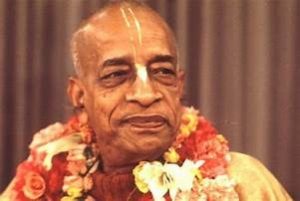
May 28 1975 Honolulu
Devotee (2): …follow Kṛṣṇa consciousness very strictly and very seriously like, say, for the rest of our lives, is there a chance that we’ll be able to see Rādhā and Kṛṣṇa in this life?
Prabhupāda: Certainly. You read Bhagavad-gītā?
Devotee (2): Yes.
Prabhupāda: So there is stated, “If you simply try to understand Kṛṣṇa, then you go back to home.” Janma karma ca me divyam [Bg. 4.9]. That is stated. If you simply understand how Kṛṣṇa takes birth, how He goes away, why does He come, what is His mission, these things, if you can understand, then you are a fit candidate to go back to home. So that is explained everything in the Bhagavad-gītā. You try to understand. Then you are guaranteed. Where is the difficulty? And if you think, “Kṛṣṇa is an ordinary man like us,” then finished. Then do not understand Kṛṣṇa. If you simply accept this word faithfully, vāsudevaḥ sarvam iti [Bg. 7.19], “Everything is Kṛṣṇa,” then your knowledge is perfect.
Devotee (3): Even if we don’t understand Kṛṣṇa completely… Even if we don’t understand Kṛṣṇa completely, if we just…
Prabhupāda: This is complete understanding, that “Everything is Kṛṣṇa.” That’s all. That is a fact. Everything is the energy of Kṛṣṇa. Just like in this material world everyone knows everything is the sunshine. Due to the sunshine, everything is coming. That’s a fact. Science…
—————————————————
Dovetailing our professional work for the satisfaction of God and pleasing the Lord is as good as being bald headed and working full time for Krsna

May 22 1975 Melbourne
Come here.
Śrutakīrti:idaṁ hi puṁsas tapasaḥ śrutasya vā sviṣṭasya sūktasya ca buddhi-dattayoḥ
avicyuto ‘rthaḥ kavibhir nirūpito yad-uttamaśloka-guṇānuvarṇanam [SB 1.5.22]
“Learned circles have positively concluded that the infallible purpose of the advancement of knowledge, namely austerities, study of the Vedas, sacrifice, chanting of hymns and charity, culminates in the transcendental descriptions of the Lord, who is defined in choice poetry.”
Prabhupāda: The advancement of knowledge in any department, that is very good. But what is the aim? The aim is to glorify the Supreme Lord. Just like you are lawyer. You gave us help in some difficulty time. Why? Because you wanted to continue glorification of the Lord, that “These men are doing nice. Why they should be harassed?” So that means you helped glorification of the Lord. So that’s your success as a lawyer. So anyone who helps this movement, that “They are spreading Kṛṣṇa consciousness, God consciousness. They should be helped in all respect,” that is the perfection. Everything is required, but it should be culminated in the matter of glorifying the Supreme. Then it is perfect. In another place… Find out this verse,
ataḥ pumbhir dvija-śreṣṭhā varṇāśrama-vibhāgaśaḥ svanuṣṭhitasya dharmasya
saṁsiddhir hari-toṣaṇam [SB 1.2.13]
Just like you have helped this institution in a difficult position. That means you have pleased Kṛṣṇa. That is your success. My devotees are in difficulty.
They wanted some legal help. You, as a lawyer, helped them, so you have pleased Kṛṣṇa, God. That is the aim of life. Whether by my work in different spheres, as a lawyer, as a businessman, or as a scholar, as a philosopher, as a scientist, as an economist… There are so many demands. It doesn’t matter. But you should see whether you are successful. And what is the standard of success? The standard of success is whether you have pleased God. You read this. Ataḥ pumbhir dvija-śreṣṭhāḥ…
Śrutakīrti: ataḥ pumbhir dvija-śreṣṭhā varṇāśrama-vibhāgaśaḥ svanuṣṭhitasya dharmasya
saṁsiddhir hari-toṣaṇam [SB 1.2.13]
“Oh best among the twice-born, it is therefore concluded that the highest perfection one can achieve by discharging his prescribed duties, dharma, according to caste divisions and order of life, is to please the Lord, Hari.“
Prabhupāda: That is religion. That should be developed, that “Whether by my profession, by my business, by my talent, by my capacities…” There are different categories. “Whether I have pleased God?” Then it is successful. If you have pleased God by your legal profession—you are in a different dress—it doesn’t matter. You are as good as they are whole time only serving God. Because their business is also to please God. Similarly, if you have pleased God, then even by practicing your law, you are as good as the saintly person. That should be the aim, “Whether I have pleased God with my professional duty or occupational duty?” That is the standard. Let people take up this. We don’t say that “You change your position. You become a sannyāsī or you give up your profession and become bald-headed.” No, we don’t say that. (laughs) We are by nature. (laughter) So this is Kṛṣṇa consciousness, that you remain in your position, but see whether by your discharge of duties you have pleased God.



